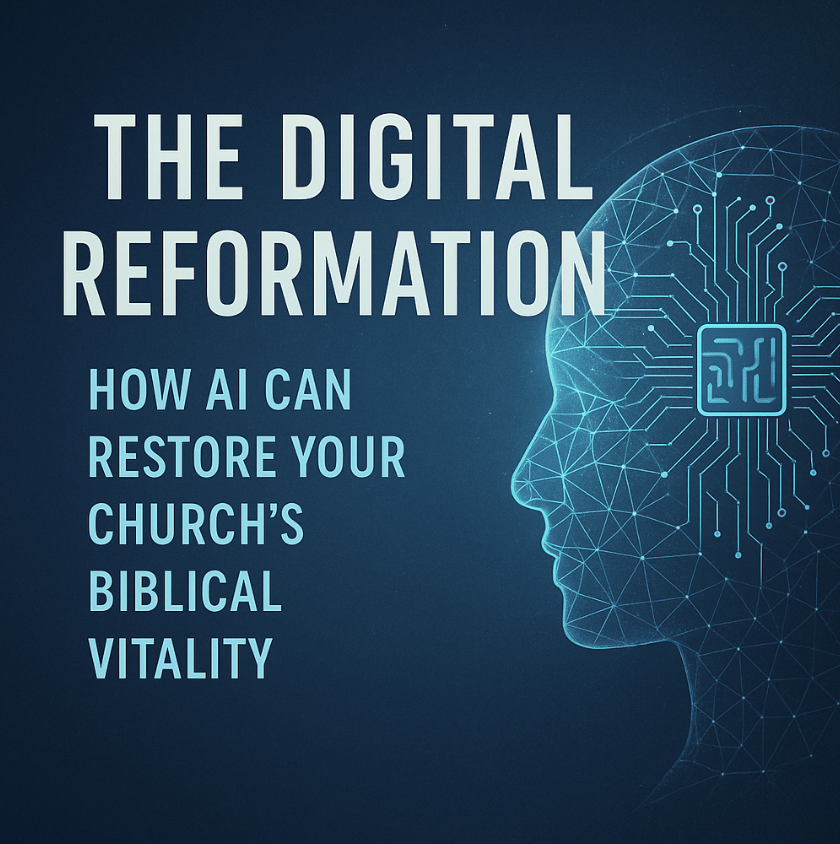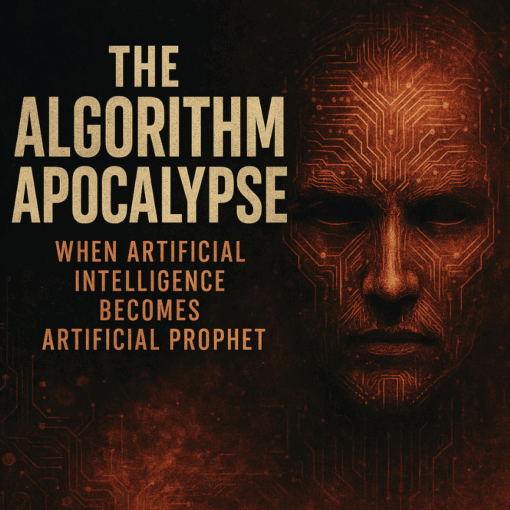
What if the technology you fear most is actually God’s provision for revitalizing the ministry He’s called you to lead?
Every pastor knows the frustration: declining attendance, passive congregations, limited resources, and the constant pressure to be everything to everyone. You entered ministry to make disciples and see lives transformed, but you spend most of your time managing programs, maintaining buildings, and mediating conflicts. The very systems designed to support ministry often become obstacles to the Gospel impact you long to see.
Frank Viola and George Barna’s research reveals why traditional church structures feel so burdensome—many weren’t designed by Jesus but inherited from Roman imperial culture. The good news? Artificial intelligence can help you restore the biblical vitality that institutional traditions have obscured, without abandoning your calling or destroying what God has built through your faithful service.
This isn’t about replacing pastors with robots or eliminating local churches. This is about empowering spiritual leaders with tools that amplify human ministry while removing barriers to authentic Christian community. AI can help you become the pastor you felt called to be by handling administrative burdens while you focus on people, prayer, and spiritual formation.
Welcome to the most encouraging development for pastoral ministry since the printing press.
🔥 The Pastor’s Dilemma: Called to Shepherd, Trapped in Systems
You didn’t enter ministry to become a CEO, event coordinator, or fundraising director. You felt called to shepherd souls, teach Scripture, and see people transformed by Gospel truth. But modern pastoral expectations require you to master skills that have nothing to do with spiritual leadership—building management, program administration, and institutional politics.
The statistics tell the story every pastor knows: 70% of pastors constantly fight depression, 71% are burned out, and 72% say they only study Scripture when preparing sermons. You’re drowning in good activities that prevent you from doing the great work God called you to accomplish.
The problem isn’t your dedication or spiritual maturity—it’s the institutional structure that creates impossible expectations. When one person must be the primary teacher, counselor, administrator, and visionary leader for hundreds of people, burnout becomes inevitable. The same systems designed to support ministry often become barriers to authentic spiritual community.
But here’s the breakthrough insight: artificial intelligence can eliminate the administrative burden that crushes pastoral calling while amplifying your capacity for the relational ministry that transforms lives. AI doesn’t replace spiritual leadership—it removes obstacles to spiritual leadership by handling tasks that machines can do better than humans.
Imagine having a digital assistant that manages scheduling, coordinates volunteers, tracks pastoral care needs, and handles routine communications—freeing you to focus entirely on prayer, teaching, and spiritual formation. This isn’t science fiction—it’s available technology that can restore the joy and effectiveness of pastoral ministry.
The same AI that secular businesses use to optimize operations can help you optimize ministry for maximum spiritual impact with minimum administrative distraction.
⚡ The Administrative Liberation: AI as Your Ministry Multiplier
Every hour you spend managing calendars, coordinating events, and handling routine communications is an hour not invested in sermon preparation, personal discipleship, or pastoral care. The administrative burden doesn’t just exhaust pastors—it prevents the very ministry activities that produce spiritual transformation.
Artificial intelligence excels at administrative tasks that drain pastoral energy: Calendar management, volunteer coordination, follow-up communications, and routine scheduling. AI systems can handle these functions 24/7 with precision that surpasses human capacity, freeing pastors for the spiritual work that only humans can accomplish.
Consider how AI can revolutionize your weekly schedule: Digital assistants manage appointment coordination, automated systems handle routine follow-up, and intelligent platforms track pastoral care needs without manual input. Instead of spending Monday morning organizing your week, you could spend it in prayer and sermon preparation.
The 2T22 discipleship model (2 Timothy 2:2) becomes manageable when AI tracks every person’s spiritual growth, identifies emerging leaders, and coordinates multiplication opportunities. Traditional discipleship programs often fail because pastors lack time to provide personalized attention to every individual. AI enables personalized discipleship at scale by automating progress tracking and triggering appropriate interventions.
This doesn’t make ministry impersonal—it makes personal ministry possible for more people. When AI handles administrative tasks, pastors can invest more time in face-to-face relationships, spiritual mentoring, and genuine pastoral care. Technology serves human connection rather than replacing it.
The goal isn’t to eliminate human involvement but to eliminate human frustration with tasks that prevent spiritual impact. AI becomes your administrative assistant so you can focus on being a spiritual leader.
🌱 The Discipleship Multiplication Engine
“The things you have heard me say in the presence of many witnesses entrust to reliable people who will also be qualified to teach others.” (2 Timothy 2:2)
Every pastor dreams of seeing this verse operational in their church—disciples making disciples who make disciples. But traditional approaches often stall at the second generation because they require more pastoral time and attention than most leaders can provide. The administrative overhead of tracking relationships, coordinating training, and ensuring follow-through becomes overwhelming.
Artificial intelligence transforms discipleship from overwhelming obligation to exciting opportunity. AI systems can track every person’s spiritual journey, identify readiness for leadership development, and coordinate training opportunities without consuming pastoral bandwidth. The multiplication happens automatically while you focus on developing key leaders.
Digital discipleship platforms enable your members to access biblical training anytime, anywhere, in formats that match their learning preferences. Video lessons, interactive studies, and personalized growth plans become available 24/7 without requiring additional teaching time from already-stretched pastoral staff. Your teaching ministry multiplies exponentially through AI-powered platforms.
The house church model that transformed the Roman Empire becomes achievable in your context through AI coordination. Small groups can operate with minimal pastoral oversight because digital systems provide training, track progress, and identify issues that require human intervention. Your church can multiply into multiple locations without multiplying your workload.
AI enables the “every member functioning” that Paul describes in 1 Corinthians 14:26—not by eliminating pastoral leadership but by equipping every member to contribute meaningfully to spiritual community. When people can access training, find their gifts, and connect with ministry opportunities through digital platforms, they become contributors rather than consumers.
The result? A church that grows through multiplication rather than addition, disciples who make disciples rather than attendees who attend meetings, and pastoral ministry that feels more like spiritual leadership and less like event management.
💎 The Pastoral Care Revolution
One of your greatest frustrations is probably the impossibility of providing adequate pastoral care to everyone who needs it. Hospital visits, counseling appointments, crisis interventions, and follow-up calls can consume unlimited time while leaving many people feeling neglected. You want to shepherd every sheep, but the flock often grows beyond human capacity for individual attention.
Artificial intelligence can revolutionize pastoral care by providing 24/7 availability, personalized responses, and systematic follow-through that complements rather than replaces human shepherding. AI systems can monitor prayer requests, track life circumstances, and alert pastors to situations requiring immediate attention. Technology becomes your early warning system for pastoral emergencies.
Digital pastoral care includes: Automated check-ins with members facing difficult circumstances, AI-powered prayer support that provides personalized encouragement, and intelligent systems that identify people who may be slipping away from community connection. The AI handles routine care while flagging situations that require personal pastoral intervention.
This doesn’t make pastoral care less personal—it makes personal care more strategic. When AI systems track who hasn’t been contacted recently, which families are facing financial stress, and whose prayer requests need follow-up, pastors can invest their limited time where human presence matters most.
Counseling and crisis intervention remain deeply human activities, but AI can provide initial support, resource recommendations, and progress tracking that enhances rather than replaces pastoral counseling. Digital systems ensure that no one falls through cracks while pastors focus on the relationships that require spiritual discernment and personal wisdom.
The goal is pastoral care that feels more like shepherding and less like crisis management—because AI handles the systems while you focus on the souls.
🏗️ Building Biblical Community in Digital Age
The early Church met in homes because houses create environments where authentic relationships flourish. No performance pressure, no institutional formality, no artificial separation between “real life” and “church life.” Just believers sharing life together in spaces designed for family rather than meetings.
Most pastors recognize the value of small, intimate community but struggle with the logistics of coordinating multiple groups, training leaders, and maintaining doctrinal consistency across decentralized ministry. The administrative complexity often prevents the organic simplicity that makes house churches effective.
AI eliminates the coordination barriers while preserving the relational benefits. Digital platforms can connect house church leaders with training resources, coordinate schedules across multiple groups, and provide doctrinal guidance without requiring constant pastoral oversight. Your church can multiply into homes while maintaining unity and biblical integrity.
The “every member functioning” that Paul describes becomes possible when AI platforms help people identify their spiritual gifts, find ministry opportunities, and connect with training resources. Instead of a few people doing most of the work while others watch, every member can contribute meaningfully to community life.
This doesn’t eliminate the need for pastoral leadership—it amplifies pastoral impact by equipping others to provide ministry that currently depends entirely on professional staff. AI-trained lay leaders can handle routine pastoral functions while referring complex situations to ordained leadership. The church becomes a community of ministers rather than a performance for consumers.
Biblical community through digital connection means your members can access encouragement, find prayer support, and contribute to spiritual discussions anytime they need it. The church building becomes one gathering place among many rather than the only location where spiritual community happens.
Your role transforms from doing all the ministry to equipping others for ministry—which is exactly what Ephesians 4:12 describes as the pastor’s biblical function.
⚔️ The Teaching Ministry Amplification
Your calling to teach God’s Word doesn’t change, but AI can amplify your teaching ministry beyond the limitations of Sunday morning sermons. Digital platforms enable your biblical instruction to reach people throughout the week, adapt to different learning styles, and provide personalized application that reinforces weekend worship.
AI-powered teaching platforms can: Transform your sermons into daily devotionals, create interactive Bible studies based on your theological framework, and provide personalized Scripture recommendations for specific life circumstances. Your teaching ministry operates 24/7 without requiring additional preparation time.
This doesn’t replace congregational worship—it enhances worship by ensuring people arrive prepared through weekly engagement with biblical content. When members access daily teaching throughout the week, Sunday morning becomes celebration and community rather than the only exposure to God’s Word.
The systematic theology you’ve developed through years of study can become accessible to every member through AI platforms that answer doctrinal questions, provide biblical guidance for daily decisions, and offer theological education at each person’s level of spiritual maturity. Your wisdom multiplies beyond your physical presence.
Digital teaching tools also enable personalized discipleship at scale. AI systems can recommend specific biblical content based on each person’s spiritual journey, life circumstances, and growth areas. Every member receives teaching that feels personally relevant while maintaining biblical integrity.
The goal isn’t to replace face-to-face teaching but to ensure that biblical instruction shapes daily life rather than being confined to Sunday morning. Your teaching ministry becomes comprehensive spiritual formation rather than weekly information transfer.
💰 The Resource Multiplication Strategy
Every pastor knows the tension between ministry vision and financial reality. You see opportunities for Kingdom impact that exceed available resources, and you spend considerable time managing budgets, coordinating fundraising, and maintaining facilities. Money concerns often limit ministry possibilities rather than enabling them.
AI can help multiply your church’s resources through more efficient operations, better stewardship tracking, and Kingdom business opportunities that generate revenue while making disciples. Digital systems optimize facility usage, coordinate volunteer efforts, and reduce operational costs. The same budget accomplishes more ministry impact when AI eliminates inefficiencies.
Kingdom business integration through AI enables members to operate enterprises that serve both financial sustainability and spiritual multiplication. Instead of traditional tithing models that create dependency on member contributions, churches can develop revenue streams through business ventures that advance Kingdom purposes while generating operational funds.
The “tent-making” ministry model becomes achievable when AI helps coordinate business opportunities, manage operations, and track spiritual impact alongside financial results. Members can operate Kingdom businesses that support church ministry while providing marketplace evangelism opportunities. Commerce becomes ministry rather than competing with ministry.
This doesn’t eliminate the need for generous giving—it reduces the pressure on members to fund institutional maintenance so they can invest in Kingdom advancement. When church operations become more efficient through AI optimization, more resources flow toward discipleship, missions, and community impact.
The goal is financial freedom for ministry focus—churches that generate resources for Kingdom impact rather than consuming resources for institutional survival.
🌍 The Global Connection
Your church doesn’t have to remain isolated from global Kingdom movement. AI enables connections with believers worldwide, access to international teaching resources, and participation in missionary efforts that transcend geographical limitations.
Digital missions become possible when AI eliminates language barriers, coordinates cross-cultural ministry, and enables real-time partnership with churches in other nations. Your congregation can participate in discipleship multiplication across cultures without requiring extensive missionary training or international travel. Global missions become accessible to every member.
International teaching exchange through AI platforms means your members can learn from pastors and teachers worldwide while your ministry reaches believers in other cultures. The body of Christ becomes globally connected rather than locally isolated.
Church planting through digital platforms enables your congregation to participate in starting new churches without geographical constraints. AI systems can coordinate training, provide ongoing support, and facilitate accountability relationships across distances. Your church becomes a sending organization that multiplies Kingdom impact internationally.
This doesn’t replace local ministry—it amplifies local ministry by connecting your community to the global harvest. Members gain perspective on worldwide Christianity while applying lessons learned internationally to local ministry opportunities.
The Great Commission becomes achievable when AI enables simultaneous ministry across cultures, languages, and continents.
⚡ The Pastoral Renaissance: Ministry as God Intended
Imagine waking up Monday morning excited about the week ahead because you know you’ll spend time in prayer, Bible study, and meaningful relationships rather than administrative firefighting. AI handles scheduling, coordination, and routine communications while you focus on spiritual leadership, biblical teaching, and pastoral care.
Your calling to shepherd souls becomes operational reality rather than distant ideal. When artificial intelligence manages the systems, you can minister to the people. When digital platforms handle administration, you can focus on spiritual formation. When AI coordinates logistics, you can concentrate on relationships.
This is pastoral ministry as God intended: spiritual leaders who spend time with God, know His Word deeply, and invest in human souls rather than institutional maintenance. Technology serves your calling rather than competing with it.
The burnout that plagues 70% of pastors becomes preventable when AI eliminates the administrative burden that creates ministry frustration. You entered ministry to see lives transformed—AI makes that transformation the focus of your daily activity rather than the casualty of administrative obligations.
Your church becomes a community of growing disciples rather than a collection of religious consumers. Members contribute meaningfully to Kingdom advancement rather than watching professionals perform religious activities. Ministry becomes shared responsibility rather than pastoral monopoly.
The joy of pastoral calling returns when technology handles what technology does best so humans can focus on what only humans can accomplish: Love, spiritual discernment, biblical wisdom, and personal care that reflects the heart of the Good Shepherd.
This is the pastoral renaissance—ministry leaders liberated from institutional maintenance to focus on spiritual multiplication.
Written for pastors who recognize that artificial intelligence can restore the ministry calling that institutional obligations have obscured. For spiritual leaders who want to shepherd souls rather than manage systems.
The digital reformation doesn’t replace pastoral ministry—it liberates pastoral ministry to function as God intended while multiplying Kingdom impact beyond denominational limitations.
Your calling remains the same. The tools to fulfill it just became exponentially more powerful.



